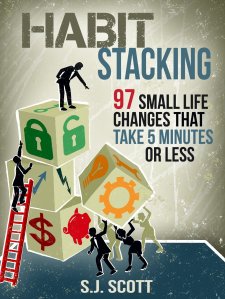I found this book on Farnam Street’s blog. If you haven’t checked out his blog, I suggest you do if you want to learn something. This guy is a genius.
I’ve read a lot of articles how certain habits will “change your life,” whether it be meditating, keeping a journal, stretching, etc. The problem is, I’ll do it for a day or two, then quit. I tend to use the good ole time excuse, though in reality, I just end up sleeping through my alarm.
Habit Stacking’s main idea is that if you create a routine of mini-habits (all less than 5 minutes) managed by a checklist, you can realize significant benefit your life.
The reason Habit Stacking works, according to the author, is that you eliminate the stress of trying to change too many things at once. Your goal is to simply focus on a single routine that takes between 15 – 30 minutes to complete. Within the routine is a serious of small mini-habits. Creating a checklist is necessary as (i) you don’t have to rely on your memory to complete the actions and (ii) you get a sense of accomplishment as you get through each item on your list. The key is consistency – you must do every day until it becomes second nature, like brushing your teeth (I hope).
There are eight elements to a habit stacking routine:
- Each element takes five minutes or less
- It is a complete habit: this means the habit cannot be built upon. For example, exercises change over time; however making your bed doesn’t
- It improves your life
- It is simple to complete
- The entire habit stacking routine less than 30 minutes
- Follows a logical process: it should be like a production line and there should be constant action until complete
- Follows a checklist
- Fits your life – take advantage of your time and location with habit stacking
The author then goes through 97 potential changes in the following areas: productivity, relationships, finances, organization, spirituality, health and physical fitness and leisure. Obviously, you don’t have to agree with all or even most, but there are definitely a lot to pick and choose from and generate ideas.
One area I thought was interesting was to know “why” you are doing each individual action. This should motivate you to keep at the task at hand done. I tend to lose motivation for certain habits I know are good for me because I forget what the greater goal of it is.
Another area that I liked was how to deal with habit disruptions. Say you have a morning routine but you don’t sleep at your own home (giggity), what to do then. The book outlines some strategies for things like that.
- This book would have no purpose to me unless I put his ideas to action. I created a morning habit stacking routine. The book says to start one routine at a time so I will probably add something for when I get to work and leave work after a couple of weeks.
Morning: right when I wake up
- Write three things I am grateful or happy about: 1 minute – why: it has been proven over and over that shifting your focus to the positive can dramatically improve your happiness:
- Make my bed: 1 minute – why: makes my bedroom look instantly organized and I am in a better mood when I come home and my bed is made
- Stretch: 3 minutes – why: increases my flexibility and performance
- Put away three things: 3 minutes – why: this will help to not have things accumulate around my apartment
- Drink 16 ounces of water: 2 minute – why: water is good for you and I will get 2 out of my 8 in at once; also will make me less hungry for breakfast
- Take vitamins: 1 minute – why: health benefits
- Read a Wikipedia article and / or watch an inspirational video: 3 minutes – why: learn something new and boost my interesting factor
- Give a compliment / send a text: 1 minute – why: because I would love if I got the same!
Total time: 15
As you can see, none of this stuff is mind-blowing. In fact, it is all really, really simple. However, it is all about consistency and that is what I have be working on.
Update
I started my habit-stacking list on Tuesday, September 9th. This blog was posted on Tuesday, September 15th, one week later. So far, I have been consistent with the routine and find using a checklist really does help. Also, making sure you are prepared is key (i.e., I bought one of those daily vitamin holders that I thought only old people used). Since the habits are so small, there is no stress to get them done and thus I actually stick to it. I plan on sticking with the routine and likely adding to / adjusting as I see fit.

